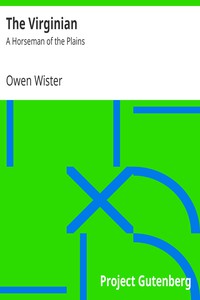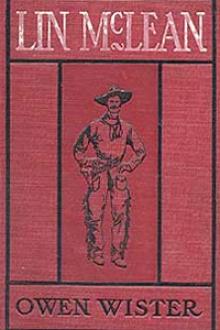The Virginian: A Horseman of the Plains, Owen Wister [best e books to read txt] 📗

- Author: Owen Wister
Book online «The Virginian: A Horseman of the Plains, Owen Wister [best e books to read txt] 📗». Author Owen Wister
“Good-by, Pedro,” he said—“good-by.” Pedro looked for bread.
“No,” said his master, sorrowfully, “not any more. Yu' know well I'd give it yu' if I had it. You and me didn't figure on this, did we, Pedro? Good-by!”
He hugged his pony again, and got as far as the bars of the pasture, but returned once more. “Good-by, my little horse, my dear horse, my little, little Pedro,” he said, as his tears wet the pony's neck. Then he wiped them with his hand, and got himself back to the bunk house. After breakfast he and his belongings departed to Drybone, and Pedro from his field calmly watched this departure; for horses must recognize even less than men the black corners that their destinies turn. The pony stopped feeding to look at the mail-wagon pass by; but the master sitting in the wagon forebore to turn his head.
XXVI. BALAAM AND PEDRO
Resigned to wait for the Judge's horses, Balaam went into his office this dry, bright morning and read nine accumulated newspapers; for he was behindhand. Then he rode out on the ditches, and met his man returning with the troublesome animals at last. He hastened home and sent for the Virginian. He had made a decision.
“See here,” he said; “those horses are coming. What trail would you take over to the Judge's?”
“Shortest trail's right through the Bow Laig Mountains,” said the foreman, in his gentle voice.
“Guess you're right. It's dinner-time. We'll start right afterward. We'll make Little Muddy Crossing by sundown, and Sunk Creek to-morrow, and the next day'll see us through. Can a wagon get through Sunk Creek Canyon?”
The Virginian smiled. “I reckon it can't, seh, and stay resembling a wagon.”
Balaam told them to saddle Pedro and one packhorse, and drive the bunch of horses into a corral, roping the Judge's two, who proved extremely wild. He had decided to take this journey himself on remembering certain politics soon to be rife in Cheyenne. For Judge Henry was indeed a greater man than Balaam. This personally conducted return of the horses would temper its tardiness, and, moreover, the sight of some New York visitors would be a good thing after seven months of no warmer touch with that metropolis than the Sunday HERALD, always eight days old when it reached the Butte Creek Ranch.
They forded Butte Creek, and, crossing the well-travelled trail which follows down to Drybone, turned their faces toward the uninhabited country that began immediately, as the ocean begins off a sandy shore. And as a single mast on which no sail is shining stands at the horizon and seems to add a loneliness to the surrounding sea, so the long gray line of fence, almost a mile away, that ended Balaam's land on this side the creek, stretched along the waste ground and added desolation to the plain. No solitary watercourse with margin of cottonwoods or willow thickets flowed here to stripe the dingy, yellow world with interrupting green, nor were cattle to be seen dotting the distance, nor moving objects at all, nor any bird in the soundless air. The last gate was shut by the Virginian, who looked back at the pleasant trees of the ranch, and then followed on in single file across the alkali of No Man's Land.
No cloud was in the sky. The desert's grim noon shone sombrely on flat and hill. The sagebrush was dull like zinc. Thick heat rose near at hand from the caked alkali, and pale heat shrouded the distant peaks.
There were five horses. Balaam led on Pedro, his squat figure stiff in the saddle, but solid as a rock, and tilted a little forward, as his habit was. One of the Judge's horses came next, a sorrel, dragging back continually on the rope by which he was led. After him ambled Balaam's wise pack-animal, carrying the light burden of two days' food and lodging. She was an old mare who could still go when she chose, but had been schooled by the years, and kept the trail, giving no trouble to the Virginian who came behind her. He also sat solid as a rock, yet subtly bending to the struggles of the wild horse he led, as a steel spring bends and balances and resumes its poise.
Thus they made but slow time, and when they topped the last dull rise of ground and looked down on the long slant of ragged, caked earth to the crossing of Little Muddy, with its single tree and few mean bushes, the final distance where eyesight ends had deepened to violet from the thin, steady blue they had stared at for so many hours, and all heat was gone from the universal dryness. The horses drank a long time from the sluggish yellow water, and its alkaline taste and warmth were equally welcome to the men. They built a little fire, and when supper was ended, smoked but a short while and in silence, before they got in the blankets that were spread in a smooth place beside the water.
They had picketed the two horses of the Judge in the best grass they could find, letting the rest go free to find pasture where they could. When the first light came, the Virginian attended to breakfast, while Balaam rode away on the sorrel to bring in the loose horses. They had gone far out of sight, and when he returned with them, after some two hours, he was on Pedro. Pedro was soaking with sweat, and red froth creamed from his mouth. The Virginian saw the horses must have been hard to drive in, especially after Balaam brought them the wild sorrel as a leader.
“If you'd kep' ridin' him, 'stead of changin' off on your hawss, they'd have behaved quieter,” said the foreman.
“That's good seasonable advice,” said Balaam, sarcastically. “I could have told you that now.”
“I could have told you when you started,” said the Virginian, heating the coffee for Balaam.
Balaam was eloquent on the outrageous conduct of the horses. He had come up with them evidently striking back for Butte Creek, with the old mare in the lead.
“But I soon showed her the road she was to go,” he said, as he drove them now to the water.
The Virginian noticed the slight limp of the mare, and how her pastern was cut as if with a stone or the sharp heel of a boot.





Comments (0)